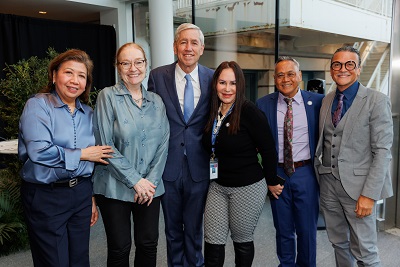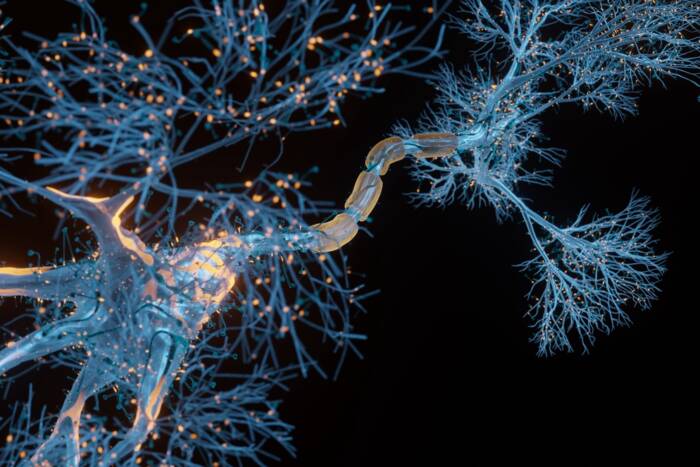Albany Medical Center Prize awarded to James E. Darnell Jr. and Robert G. Roeder
Two Rockefeller University pioneers in the field of gene regulation and expression will be honored with the Albany Medical Center Prize in Medicine and Biomedical Research, the nation’s largest prize in medicine.
James E. Darnell Jr., head of the Laboratory of Molecular Cell Biology at Rockefeller University, and Robert G. Roeder, head of the Laboratory of Biochemistry and Molecular Biology, will share the $500,000 prize from the 12th annual award, given at a May 11 ceremony in Albany, NY.
Praised as “towering figures” in cell research, the scientists are being recognized for helping to define how cells grow, replicate, and become specialized, and in turn giving medical professionals and researchers the tools to improve health and combat diseases.
“Jim Darnell and Bob Roeder have been at the forefront of our understanding of gene expression since their first groundbreaking discoveries in RNA processing more than 40 years ago,” says Marc Tessier-Lavigne, president of The Rockefeller University. “Their contributions to this field have provided indispensable support to scientists and physicians in the fight to understand and combat diseases like cancer, heart disease and autoimmune disorders. I’m pleased to see them honored with such an exemplary award.”

James E. Darnell Jr.
Darnell, the Vincent Astor Professor Emeritus, was a professor at the Massachusetts Institute of Technology in 1963 when he discovered “RNA processing” in human cells while studying messenger RNA — or mRNA. He discovered that a precursor to mRNA was first copied from DNA and then “processed” for a cell’s specific purpose. Darnell later made critical discoveries in the area known as “cytokine signaling” — the passage of signals from outside a cell to direct copying of RNA from specific DNA sites (genes). This work uncovered an important signaling route named the JAK-STAT pathway. Currently, Darnell’s lab studies how signals from the cell surface affect transcription of genes in the nucleus.
Darnell received his M.D. in 1955 from the Washington University School of Medicine. In 1974 he joined Rockefeller as Vincent Astor Professor, and from 1990 to 1991 he was vice president for academic affairs. A member of the National Academy of Sciences since 1973, he has received numerous awards, including the 2003 National Medal of Science, the 2002 Albert Lasker Award for Special Achievement in Medical Science, the 1997 Passano Award and the 1986 Gairdner Foundation International Award.
He is the coauthor with S.E. Luria of General Virology and the founding author with Harvey Lodish and David Baltimore of Molecular Cell Biology, now in its sixth edition. His book RNA, Life’s Indispensable Molecule was published in July 2011 by Cold Spring Harbor Laboratory Press.

Robert G. Roeder
Roeder, the Arnold and Mabel Beckman Professor, began his career as a University of Washington graduate student, where he discovered in 1969 that three enzymes, called RNA polymerases, play a role in gene transcription in animal cells. In the late 1970s, using purified polymerases and synthetic copies of genes, he was successful in developing the first cell-free systems to study transcription, a scientific breakthrough that allowed scientists to recreate transcription in a test tube to better study the complex processes by which cells turn genes on and off. More recently, Roeder and his colleagues have begun to apply what they have learned in a test tube to the study of living cells.
Roeder received his Ph.D. in biochemistry in 1969 from the University of Washington, Seattle, where he worked with William Rutter. He did postdoctoral work with Donald D. Brown at the Carnegie Institution of Washington from 1969 to 1971. He was a member of the faculty at the Washington University School of Medicine in St. Louis from 1971 until 1982, when he joined Rockefeller. In 1985 he was named the Arnold and Mabel Beckman Professor.
Roeder has received the Salk Institute’s Medal for Research Excellence in 2010, the 2003 Albert Lasker Basic Medical Research Award, the 2002 ASBMB-Merck Award, the 2000 Gairdner Foundation International Award, the 1999 Louisa Gross Horwitz Prize and the 1999 General Motors Cancer Research Foundation’s Alfred P. Sloan Prize. He is a member of the National Academy of Sciences.
The Albany Medical Center Prize was established in 2000 by the late Morris “Marty” Silverman to honor scientists whose work has demonstrated significant outcomes that offer medical value of national or international importance. A $50 million gift commitment from the Marty and Dorothy Silverman Foundation provides for the prize to be awarded annually for 100 years.
Previous Rockefeller University recipients of the prize include Elaine Fuchs in 2011, Ralph Steinman in 2009 and Arnold J. Levine, the first recipient of the prize in 2001.


